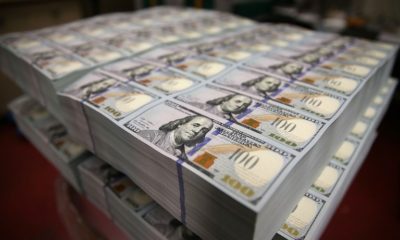- CBN’s Forex Policy Working, FG Insists
The Central Bank of Nigeria’s (CBN) current foreign exchange (forex) policy is working well and is unlikely to be changed anytime soon, the Minister of Information, Alhaji Lai Mohammed, said Thursday.
He also commended efforts of the CBN Governor, Mr. Godwin Emefiele, in ensuring exchange rate stability as well as sustained reduction in inflation in the country.
Nigeria has maintained multiple exchange rates since it was confronted with a severe forex crisis in 2015, as part of efforts to counter the impact of falling prices for crude oil, which provides 90 per cent of the country’s forex.
The International Monetary Fund (IMF) recently advised the country to scrap its multiple exchange rate policy.
But Reuters quoted Mohammed as saying that the current forex system was working well.
“Right now, the currency is converging naturally at about N360 to the dollar. Three years ago, the same was about N525 to a dollar. I don’t think the central bank is in a hurry to change this,” Mohammed said in an interview with Reuters.
“Inflation is down and the reserves are up. We are in a better position to defend the naira,” he added.
Buhari won a second term in office in a February election that was fought on the economy, which is recovering from a 2016 recession largely caused by low oil prices.
The tenure of the CBN governor is due to end in June. A decision on his future is likely to be among the first major announcements in Buhari’s second term.
Mohammed said Emefiele had done a good job, particularly with loans to support sectors such as agriculture.
He declined to comment when asked about the president’s intentions.
Emefiele recently said the CBN was improving access to credit for underserved Nigerians through the National Collateral Registry and the passage of the Credit Bureau Act.
He said: “And under this initiative, small and medium businesses are able to provide valuable assets such as equipment and livestock as collateral in other to access capital from institutions which play an emphasis on assets. And as a result of these initiatives in addition to other reforms by government, Nigeria moved up 24 points in 2017.
“Close to 70 per cent of Nigerians do not have access to financial services, hence the CBN introduced a series of steps to have a financially inclusive society, which includes the agent banking guidance and shared network facility, both of which are meant to deal deepen penetration of agent method in underserved locations across Nigeria.
“The recent launch on the Payment Service Bank in October 2018, was an additional step in leveraging on the agent networks of non-entities such as fast moving consumer goods, mobile network operators, etc. to underserved communities.
“We are happy because I remember about 18 months ago, Bill Gates mentioned that the level of financial inclusion in Nigeria was 48 per cent and they were concerned that Nigeria was not making progress. We went to work to ensure we meet 2020 target of 80 per cent. As a result of the actions we have taken, our level of financial inclusion as at last week has improved from 48 per cent to 64 per cent in the space of 18 months.
“I feel more confident that by 2020, we should certainly hit 80 per cent mark we had set for ourselves. In doing this, it is important to look at how we faired as a country during the period of this crisis relative to some other emerging markets.”
Emefiele spoke while briefing journalists at the recently concluded World Bank/IMF Spring Meetings in Washington DC.
Nigeria has managed to keep real GDP growth positive and has managed double-digit recession in contrast to other economies with similar challenges.
Following the conduct of elections in February, the country has seen close to $5 billion foreign portfolio inflows.
He said: “What we are saying is that a lot of work has been done, a lot of work still needs to be done but in the midst of this, we are saying Nigeria is open to business and investors. We will continue to work tirelessly to boost the economy of the country.
“Investors are assured that their investments in Nigeria will be duly protected by the authorities as they also have various advantages they can provide for our economy, human capital and technological know-how.”

 Billionaire Watch3 weeks ago
Billionaire Watch3 weeks ago
 Startups4 weeks ago
Startups4 weeks ago
 News4 weeks ago
News4 weeks ago
 News4 weeks ago
News4 weeks ago
 Bitcoin4 weeks ago
Bitcoin4 weeks ago
 Naira4 weeks ago
Naira4 weeks ago
 Forex3 weeks ago
Forex3 weeks ago
 Treasury Bills4 weeks ago
Treasury Bills4 weeks ago





















